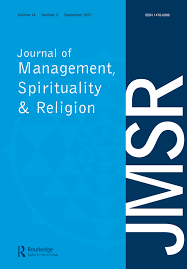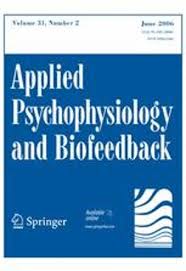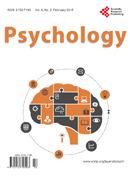Resultaten Onderzoek
U kunt publicaties vinden door te kiezen voor een categorie of een steekwoord. Alle artikelen uit betreffende categorie of met betreffend steekwoord verschijnen dan hier beneden.
Categorieën
Steekwoorden
Categorieën
Steekwoorden
- Toon alle
- ADHD
- Angst/Paniek
- Bloeddruk
- Burnout
- Chronische pijn
- Cognitieve functie
- Cortisol/DHEA
- Dementie
- Depressie
- Diabetes
- Global Coherence
- Hart- & Vaatziekten
- Intuitie & Bewustzijn
- Kanker
- Kinderen/jeugd
- Kosten
- Leiderschap
- Meditatie/Mindfulness
- Metabool syndroom
- Obesitas/eetstoornis
- PTSS
- Schizofrenie
- Slaap & vermoeidheid
- Social Coherence
- Stress
- Veerkracht
- Wetenschap HRV & Coherentie
- Zwangerschap
Psychophysiological coherence training to moderate air traffic controllers’ fatigue on rotating roster

The nature of the current rotating roster, providing 24-h air traffic services over five irregular shifts, leads to accumulated fatigue which impairs air traffic controllers’ cognitive function and task performance. It is imperative to develop an effective fatigue risk management system to improve aviation safety based upon scientific approaches. Two empirical studies were conducted to address this issue. Study 1 investigated the mixed effect of circadian rhythm disorders and resource depletion on controllers’ accumulated fatigue. Then, study 2 proposed a potential biofeedback solution of quick coherence technique which can mitigate air traffic controllers’ (ATCOs’) fatigue while on
lees verder...Psychophysical Coherence Training Regulating Air Traffic Controller's Heart Rate Variability and Resilience to Fatigue

Abstract. Heart Rate Variability (HRV) can reflect individuals’ cognitive workload objectively. HRV measurement is a non-invasive method to evaluate relevant physiological changes in a human body. Physiological changes and cognitive processes are associated with the cardiac dynamic autonomic control, and thus to influence individuals’ ability to cope with fatigue and achieve resilience. As a dynamic process to be learned, resilience can be formed and improved through Quick Coherence Training in a short time. To study the regulatory effects of
lees verder...Does Heart Rate Variability Biofeedback Enhance Executive Functions Across the Lifespan? A Systematic Review

Abstract
The scope of this systematic review was to summarize the existing literature on the effects of heart rate variability biofeedback (HRV-BF) on executive functions (EFs) across the lifespan. Specifically, it aimed to investigate the factors that may affect the efficacy of HRV-BF interventions, such as the study population, duration and intensity of the intervention, or the technical equipment. This review was conducted according to the Preferred Reporting Items for Systematic Reviews and Meta-Analyses (PRISMA) guidelines. Studies that
Driving organizational entrainment through spiritual leadership

Connectedness is considered as one of the defining characteristics of the twenty-first century, with organizational research highlighting the importance of time, pace, rhythm, and cycles in business through the phenomenon of entrainment. Entrainment is a process of synchronization and connectedness within, between, and across rhythmic activities. This conceptual paper argues that applying spiritual leadership at each level of an organization can drive the (inter)connectedness in today’s organizations through entrainment. First, the concept of entrainment is introduced, with a focus on intraentrainment. The learnings from entrainment are then applied to spiritual
lees verder...A 6-Week Worksite Positivity Program Leads to Greater Life Satisfaction, Decreased Inflammation, and a Greater Number of Employees with A1C Levels in Range Published: 2019

Objective: To determine whether a 6-week Positivity Program could impact employee cardiovascular inflammation, blood sugars, cortisol, dehydroepiandrosterone (DHEA), and/or life satisfaction.
Methods: Pre- and post-study blood draw and life satisfaction questionnaire tracked changes in 10 cardiovascular and inflammatory
lees verder...Heart Rate Variability: New Perspectives on Assessment of Stress and Health Risk at the Workplace

Introduction: Cardiovascular diseases are the highest cause of death in the world. Many of these deaths may be workplace related. Long hours at work seem to be influencing the increased risks of heart diseases. Workplace stress can be defined as the “discrepancies between the physiological demands within a workplace and the inability of employees to either manage or cope with such work demands.” The varied nature and perception of stress are exemplified from literature that shows stress being either a stimulus, or a response, or a stimulus–
lees verder...Exploring a 1-Minute Paced Deep-Breathing Measurement of Heart Rate Variability as Part of a Workers' Health Assessment

Low heart rate variability (HRV) is related to health problems that are known reasons for sick-leave or early retirement. A 1-minute-protocol could allow large scale HRV measurement for screening of health problems and, potentially, sustained employability. Our objectives were to explore the association of HRV with measures of health. Cross-sectional design with 877 Dutch employees assessed during a Workers’ Health Assessment. Personal and job characteristics, workability, psychological and mental problems, and lifestyle were measured with questionnaires. Biometry was measured (BMI, waist circumference, blood pressure, glucose, cholesterol). HRV was assessed with a 1-minute paced deep-breathing protocol and expressed as mean heart rate range (MHRR). A low MHRR indicates a higher health risk.
lees verder...Groepsverslag Stress REM vragenlijsten mei 2018

Het Soffos onderzoeksinstituut heeft in 2018 de resultaten van 1129 HeartMath coaching interventies geevalueerd. De slotconclusie van het rapport is dat de cliënten wezenlijk verbeterd zijn in hun omgang met stress door de coaching volgens de HeartMath methodiek. Bij alle dimensies is sprake van een significante verbetering van de gemiddelde scores op tijdstip T2 ten opzichte van tijdstip T1. De P-waarden zijn daarbij allen onder de 0,001, dit betekent dat de kans dat de uitslag beïnvloed wordt door andere omstandigheden dan de HeartMath coaching marginaal is.
lees verder...Building Resilience in an Urban Police Department

Objective:The aim of this study is to examine a resilience training intervention that impacts autonomic responses to stress and improves cardiovascular risk, psychological, and physiological outcomes in police. Methods: Officers [(n=38) 22 to 54 years] modified emotional and physical responses to stress using self-regulation. Measurements include psychological and physiological measures [eg, heart rate variability (HRV), blood pressure, C-reactive protein)] obtained at three time intervals. Results: Age was significantly (P<0.05) associated with
lees verder...Applying Resilience Promotion Training Among Special Forces Police Officers

Police Special Forces (a.k.a. special weapons and tactics [SWAT]) officers are tasked with responding to the most critical situations, including incidents that require specialized skills and equipment beyond typical policing activities. In this study, we tested the feasibility of applying Arnetz and colleagues’ resilience promotion training that was developed for patrol officers to SWAT team officers (n = 18). The resilience promotion training program included psychoeducation focused on police stress and resilience, and the practice of resilience
lees verder...Police department Personnel Stress Resilience training: An Institutional Case Study

The objective of this case study was to test the impact in law enforcement personnel of an innovative self-regulation and resilience building program delivered via an iPad (Apple Inc, Cupertino, California) app and personal mentoring. The Stress Resilience Training System (SRTS) app includes training on stress and its effects, HRV coherence biofeedback, a series of HeartMath self-regulation techniques (The Institute of HeartMath, Boulder Creek, California), and HRV-controlled games. The stressful
lees verder...Stress Management Based on Trait-Anxiety Levels and Sleep Quality in Middle-Aged Employees Confronted with Psychosocial Chronic Stress

A stress management program using cardiac coherence was implemented after an organizational down-sizing. The study was conducted in nine voluntary workers in order to evaluate the efficiency of the program. A baseline evaluation was conducted on psychological variables (anxiety, perceived-stress, well- being and sleep), endocrine assessments (urinary cortisol excretion, alpha-amylase and salivary concentrations) and physiological recordings (sleep and heart rate variability). The low number of
lees verder...Coherence and Health Care Cost -- RCA Actuarial Study: A Cost-Effectiveness Cohort Study

Chronic stress is among the most costly health problems in terms of direct health costs, absenteeism, disability, and performance standards. The Reformed Church in America (RCA) identified stress among its clergy as a major cause of higher-than-average health claims and implemented HeartMath (HM) to help its participants manage stress and increase physiological resilience. The 6-week HM program Revitalize you! was selected for the intervention including the emWave Personal Stress Reliever technology.
lees verder...New Hope for Correctional Officers: An Innovative Program for Reducing Stress and Health Risks

This study investigated the impact of a new stress management program on physiological and psychological stress and health risk factors among 75 correctional officers. The experimental group received training in emotion self-regulation techniques intended to reduce stress and health risk factors. Practice of the techniques was enhanced by heart rate variability feedback, which helped participants learn and sustain use of the self-management tools. Measures of physiological stress included cortisol, DHEA, cholesterol, triglycerides, fasting glucose
lees verder...